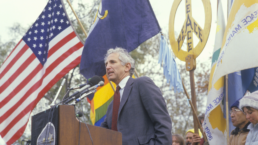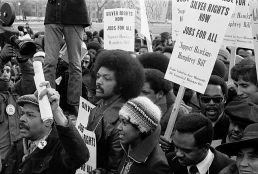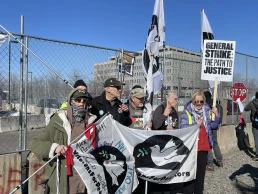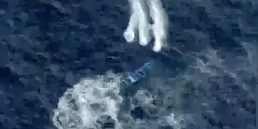Daniel Ellsberg says using the Espionage Act against journalist Julian Assange in blatant violation of the First Amendment means the First Amendment is essentially gone.
by Daniel Ellsberg, Scheerpost
Ellsberg gave the following address to the Belmarsh Tribunal on Friday night. A transcript follows.

Hi, I’m Dan Ellsberg. One of the foundation stones of our government here in the United States, for democracy and a republic, is our First Amendment to the Constitution, which forbids any law by Congress or the states abridging freedom of speech or of the press, along with freedom of religion or of assembly, that precluded the passage of a British type Official Secrets Act, which most countries have.
Almost no other country has a law singling out the press as protected by our freedom, by the First Amendment and the British type Official Secrets Act, which criminalizes any or all disclosure of information protected by the government executive branch. Even disclosure to the public or to the press or to Congress or Parliament is criminalized and subject to prison.
We’ve never had such an act because of our First Amendment. In fact, one was almost inadvertently passed by Congress in the year 2000, but it was vetoed by President Clinton as a clear cut violation of the First Amendment.
And he cited in his opinion accompanying that, some of the opinions in the Pentagon Papers case of half a century ago that had resulted from my disclosure of information that I had authorized possession of, as a contractor to the government at that time : 7000 pages of top secret documents about the history of U.S. decision making in Vietnam, which disclosed repeated sequence, by four different presidents, of lies and in effect, violations of the Constitution, treaties and in particular misleading Congress as to the costs for war. I was facing 115 years in prison, but not for Official Secrets Act, which we don’t have.
It was an experiment by President Nixon to use our Espionage Act, which had always been directed and intended for U.S. spies, giving information secretly to a foreign government, especially in time of war. It had never been used as it was by Nixon, in my case, as a substitute for an Official Secrets Act, for disclosure to the public, with no indication of my intentions there, but simply to hold that doing that was a violation.
That was dismissed on grounds of government criminality against me and there never has been a Supreme Court decision on whether using the Espionage Act, as is now facing Julian Assange as a basis for an attempt to extradite him from Britain to the U.S., was constitutional.
They’ve never received it, even though there have been dozens of cases since then. Since my case in which the act was used as if it were an Official Secrets Act, in effect making it a reliable substitute for withholding from the public any information the government doesn’t want it to have, which is an enormous amount of information.
Up until the Julian Assange indictment, the act, however, had never been used as an Official Secrets Act against other than sources like myself, who had possession of information, who disclosed it to the public.
It had never being used against a journalist, like Julian Assange, although in each case of course, of such disclosures or leaks, some form or media was involved, and many, many people involved. But they had never been indicted for that before.
Actually, if you’re going to use the act against a journalist in blatant violation of the First Amendment’s denial of Congress’s ability to criminalize acts by journalists, by the press, the First Amendment is essentially gone.
They say we were the first to have it. We fought a war of independence and established a constitution. So we have a First Amendment. Britain does not, where Julian now is, and they have an Official Secrets Act, which we don’t.
If we acquire that, we give up the main result, I would say, of that War of Independence, in the sense that we are no longer really a Republic, or a Democracy. We have monarchical powers, imperial powers, formally, and every empire requires secrecy to cloak its acts of violence that maintain it as an empire. It’s a major change from our former government.
The fact is that the Espionage Act is even broader than the British Official Secrets Act, and that’s why Congress, people in Congress who wanted to uphold secrecy have given up trying to pass a formal Official Secrets Act.
They prefer the Espionage Act because the wording of that act – so far not used against a journalist until Julian Assange, and not used beyond a journalist to someone who simply receives the information or possesses and maintains it without giving it to an authorized authority – that is covered by the language of the Espionage Act.
To challenge that, a year ago I released a top secret document on the Taiwan Straits Crisis of 1958 – that long ago – in which the U.S. came close to using nuclear weapons to uphold the protection of Taiwan from mainland China, an issue which is now very much facing us this year.
And I challenged that as someone who had held out and refused to give it to an authorized authority for all these years, in order to raise in court for the first time whether we can take the plain language of the Espionage Act as controlling and overruling basically the First Amendment.
To go further this year in connection with the attempt to extradite Julian Assange, I also revealed the fact that I had been as subject to indictment as Julian all this time since 2010, because I had possessed the information which he released to the newspapers before he did that. He conveyed it to me before he did that as a backup to what he was doing for the press.
In the plain language of the act then, as someone who possessed that information and did not disclose it to an authorized person, who retained it, I, like actually every reader of the Times — The New York Times, The Guardian, El Pais, Le Monde, who received and published that information, every reader all over the world comes under the plain language of that act.
I’m in effect – same with Julian – I am prepared to face a test of that act going up to the Supreme Court if necessary, and restoring our status as a republic.
I call on President Biden either to indict me, along with Julian Assange and others, or to drop this unconstitutional attempt to extradite Julian – I wouldn’t have to be extradited – or to prosecute either of us in these courts. That is really the only way for him to restore our status as a Republic and a democracy.
This transcript was originally published by Consortium News here.
Recent Posts
The Left Owes a Lot to Jesse Jackson
February 19, 2026
Take Action Now As a movement builder, spokesperson, and candidate for the presidency, Jesse Jackson’s accomplishments were massive. He was one of…
Trita Parsi Warns U.S. & Iran Have Incentives to Escalate Conflict
February 19, 2026
Take Action Now “We have a very dangerous situation, because both sides actually believe that a short, intense war may improve their…
Minneapolis: Organizing for the Protection of the Community
February 18, 2026
Take Action Now In speaking with residents in several parts of Minneapolis, beautiful stories of organizing on a block-by-block level emergedBy…
U.S. Sent a Rescue Plane For Boat Strike Survivors. It Took 45 Hours To Arrive.
February 17, 2026
Take Action Now In seas that could kill a person within an hour, it took nearly two days for a rescue plane to arrive.By Tomi McCluskey and Nick…




